Pipes for watering in the country
Country and dacha plots are becoming popular again, and this is quite understandable: for several reasons city dwellers need rest and useful physical work in the fresh air far from the noise of civilization. Many cottage owners do not just want to devote all their time at their summer cottage to rest, but also make maximum efforts to grow their own crops, organize a true oasis of greenery on the site, decorating it with beautiful flower gardens, lawns and trees. For the installation of the irrigation system of country and suburban areas, various pipes are used for irrigation in the country and connecting elements, through which water supply in the required volume will be organized.
Types of pipes
Pipes must provide reliable water supply. Made of different materials, they have different technical characteristics.
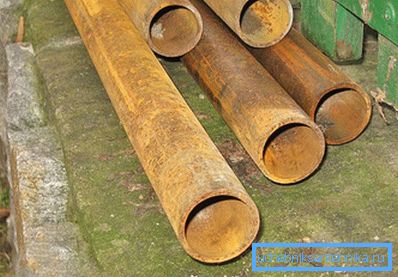
Metal pipes. The manufacturer offers pipes made of copper, stainless steel, bronze, aluminum and ordinary steel, which can be mounted both on the surface and laying the irrigation system in the ground. The advantage of using metal pipes is the durability, strength of the material with the ability to replace components. The material is convenient in that threaded fittings can be used to connect bends and elbows. The running size for mounting systems are pipes? and 1 inch.

PVC pipes. The cheapest and practical material for the installation of irrigation systems in country and suburban areas. Among the category of polymeric materials, PVC pipes have high technical characteristics: light in weight, resistant to temperature changes, the toughest among the "relatives". The material is equally good for laying ground and underground irrigation pipelines. Plastic piping is not corrosive.
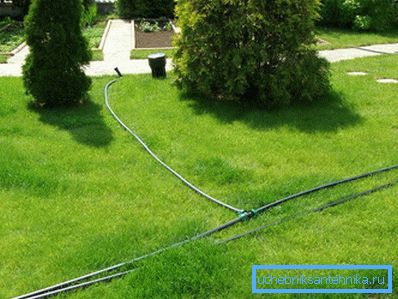
Polyethylene. The strength and elasticity of the material allows the pipeline to be operated at any time of the year. Polyethylene pipes will not burst in the cold even if there is water in them. The material is convenient not only for water supply, but also for organizing the watering system itself. Installation of the system of polyethylene pipes can be performed by any amateur master who has an apparatus for soldering.
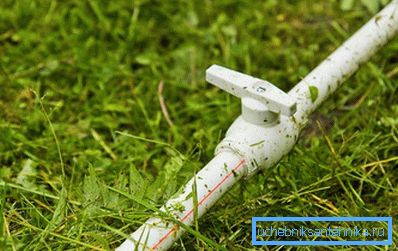
Polypropylene. The material is very similar in technical characteristics to the previous type, but in a more improved version. The material is almost eternal in operation: it is durable, perfectly tolerates low and high temperatures, light in weight, practically does not undergo corrosive damage. Pipes from polypropylene can be used as for land watering systems, and having buried them to the necessary depth.
Pipe installation rules
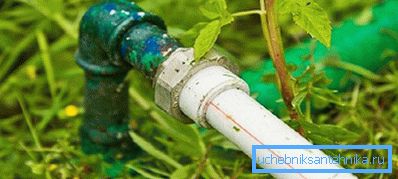
Practically from all the listed material it is possible to assemble a watering system for the suburban area. For the installation of metal pipes will require:
- two pipe wrenches (can be adjustable),
- devices for cutting the external type of thread,
- vice,
- internal threading device (required in rare cases for sweeping joints),
- cranes, adapters, connections of various configurations.
You will also need a hacksaw, or grinder, for adjustment by trimming the desired length of pipe.
Tip! Unfortunately, for the purpose of profit, metal pipelines are dismantled by dacha thieves, so it is desirable to strengthen and hide the system with all sorts of ways. You may need a welding machine for these purposes.

Polypropylene pipes are much cheaper to purchase, while the material is easy to install, and light weight contributes to the rapid pace of laying pipelines. The presence of a special tool is mandatory, since the installation features will require certain skills. You will need:
- soldering machine. With it, the joints are connected;
- scissors with special features for cutting pipes;
- fitting;
- additional fixtures to the soldering iron (nozzles).
For reliable connection, the two pipes are connected to each other by fittings. Using a soldering iron, the material is heated to the desired temperature, and both pipes are alternately soldered. Flexible hoses to the base of the pipeline is fixed using all the same fittings.
Technical characteristics of polypropylene and polyethylene
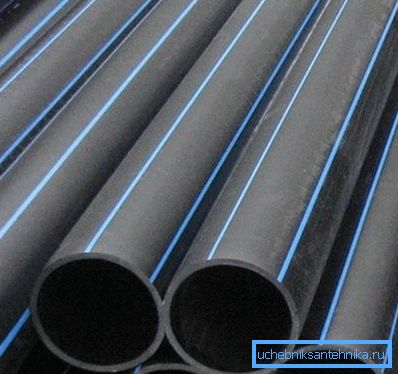
When choosing from these two materials, several differences in the characteristics of both materials should be taken into account. Polyethylene is endowed with the following features:
- The price of the material varies, somewhere it is higher compared to polypropylene pipes and connecting elements, and in some places less. For example, tees, adapters and angles are several times higher in price, while the pipes themselves are sometimes less expensive than polypropylene ones.
- They are not intended for use under high mechanical loads. The first car to drive through the pipeline will damage it.
- The material does not lend itself to corrosive damage, it is easily repaired.
- Polyethylene pipelines can be mounted both on the surface of the earth, and buried to the desired depth.
- For thieves, the material does not represent much value.
Polypropylene pipes are in many ways similar to polyethylene pipes, but there are still differences:
- As already said about pricing, the material is about the same in the purchase.
- The structure of polymers allows you to withstand the average mechanical loads, the weight of a passenger car can withstand water.
- Polypropylene is indifferent to corrosive damage. For repair work, you always need to have a welding station on hand.
- Polypropylene is suitable for all types of installation: you can lay the pipeline on the surface of the earth or bury it in the ground.
- Like polyethylene pipes, polypropylene is not popular among country thieves.
The choice always remains with the owner of the dacha, in all cases he will independently operate the irrigation system. Advice on the technical parameters of all the listed materials and choose among them an option acceptable for your country house.
Video
The following video shows how to assemble a system for irrigation of polyethylene pipes: